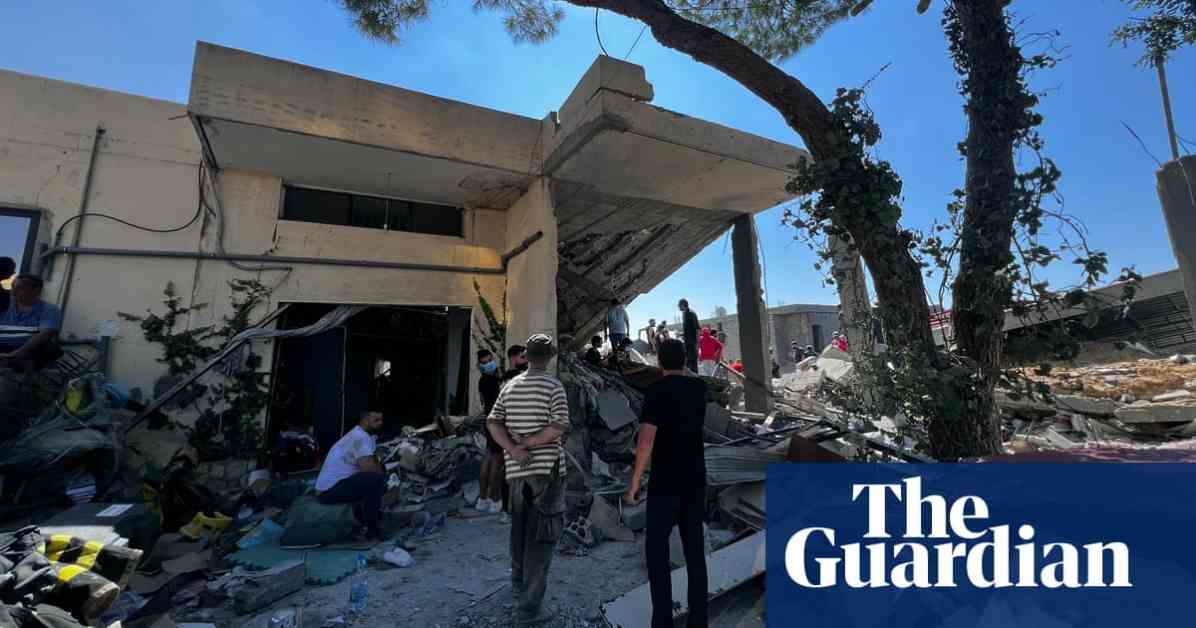Israel and Hezbollah Conflict Escalates in Lebanon: Latest Updates and Analysis
As tensions between Israel and Hezbollah continue to escalate in Lebanon, the conflict has taken a dangerous turn with both sides targeting each other’s cities in a bid to gain the upper hand. The recent airstrikes by Israel on the mountains north of Beirut and Hezbollah’s attempted strike on Tel Aviv mark a significant expansion of the aerial conflict across the Lebanese border.
Thousands of people in southern Lebanon have been forced to flee their homes to escape the relentless Israeli attacks on Hezbollah. The strikes on Maaysra, located about 60 miles north of the border, have raised concerns that the intense assault on southern Lebanon could spread to other parts of the country. Aid agencies have reported that hundreds of thousands of people have crossed into Syria to seek refuge from the ongoing violence.
Israel’s three-day bombing campaign in Lebanon has resulted in over 560 people killed and thousands injured, according to the Lebanese health ministry. The displacement of half a million people has put a strain on resources and infrastructure in Lebanon, with authorities struggling to provide assistance to those affected by the conflict.
Hezbollah’s attempt to target Tel Aviv for the first time on Wednesday was met with Israeli air defenses intercepting the surface-to-surface missile before it could cause any damage. The Lebanese group claimed they were targeting intelligence headquarters in Tel Aviv, signaling their capability to pose a serious threat to Israel despite the ongoing attacks that have killed many of their top commanders and destroyed a significant portion of their arsenal.
Israel’s military spokesperson confirmed that the missile was heading towards civilian areas along the coast, emphasizing Hezbollah’s efforts to escalate the conflict. The Israeli Defense Forces estimate that Hezbollah possessed 150,000 rockets and missiles at the beginning of the conflict, with the destruction of their arsenal being a key objective of Israel’s campaign in Lebanon.
Despite the successful strikes that have taken out senior commanders of Hezbollah, including the head of the elite Radwan force and the missile and rocket force, the group’s organizational strength and human resources remain intact. Iran’s supreme leader, Ayatollah Ali Khamenei, a key backer of Hezbollah, reassured that the group would withstand the loss of senior leaders and continue to resist Israeli aggression.
Israel’s primary goal in the conflict is to allow around 60,000 evacuees to return to their homes in northern Israel, which they were forced to flee after Hezbollah began attacking Israel in support of Hamas. Israeli defense officials are hopeful that the bombing campaign will create an opportunity for a deal that could lead to Hezbollah withdrawing from areas near the border, reducing the threat of further attacks on Israeli territory.
As Israel braces for potential retaliation from Hezbollah, tighter restrictions have been imposed, including school closures, affecting over 1 million people in northern parts of the country. The city of Haifa has been on high alert, with residents urged to take precautions against possible rocket attacks.
The conflict between Israel and Hezbollah has raised concerns globally, prompting most airlines to suspend flights to Beirut and governments to advise their citizens to evacuate the region. The risk of the air war expanding into a ground conflict or involving regional players has put the international community on edge, with calls for de-escalation and diplomatic intervention to prevent further bloodshed.
The United States has been called upon to play a key role in resolving the conflict, with Lebanon’s foreign minister expressing disappointment in President Joe Biden’s address to the UN, urging Israel to avoid full-blown war while holding Hezbollah responsible for the unprovoked attacks. The UN secretary general has warned of the potential for further escalation that could devastate Lebanon and plunge its people into a humanitarian crisis.
In the midst of the conflict with Hezbollah, Israel’s bombardment of Gaza has continued, with an airstrike on a house in the Bureij refugee camp resulting in the death of a pregnant woman and her four children. The toll of the war in Gaza has climbed to nearly 41,500 people, the majority of them civilians, highlighting the devastating impact of the ongoing violence in the region.
Efforts to reach a ceasefire and secure the release of hostages held by Hamas have been put on hold as the conflict between Israel and Hezbollah intensifies. Families and supporters of the hostages have criticized Israeli Prime Minister Benjamin Netanyahu for attending the UN general assembly in New York instead of focusing on resolving the crisis at home.
As the conflict between Israel and Hezbollah shows no signs of abating, the international community remains on high alert, calling for immediate action to prevent further escalation and protect the lives of civilians caught in the crossfire. The future of the region hangs in the balance as both sides continue to engage in a deadly game of cat and mouse, with the fate of thousands of innocent lives at stake.












